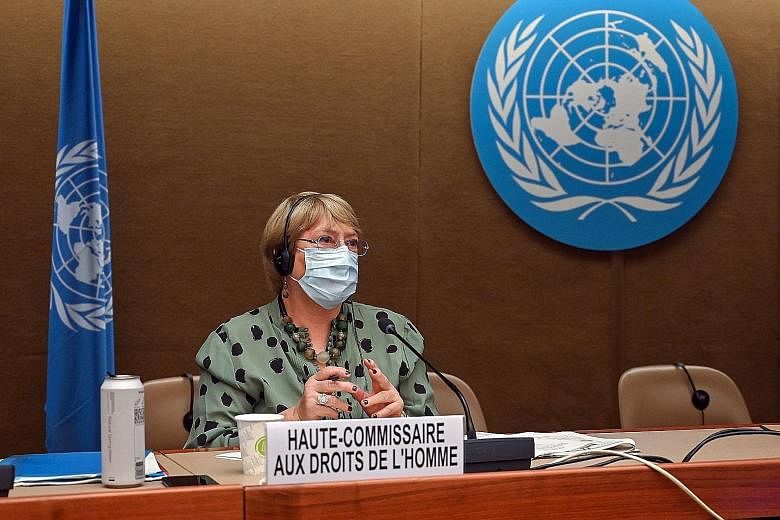GENEVA • The UN rights chief yesterday called for "concerted action" to help recover from the worst global deterioration of rights she has seen, highlighting situations in China, Russia and Ethiopia, among others.
"Extreme poverty, inequalities and injustice are rising. Democratic and civic space is being eroded," Ms Michelle Bachelet told the opening of the United Nations Human Rights Council's 47th session.
"To recover from the most wide-reaching and severe cascade of human rights setbacks in our lifetime, we need a life-changing vision, and concerted action."
The session, which is being held virtually and lasts until July 13, is due to feature an eagerly anticipated report about systemic racism, and draft resolutions focused on a range of concerning rights situations, including in Myanmar, Belarus and Ethiopia's northern Tigray region.
The UN High Commissioner for Human Rights said she was "deeply disturbed" by reports of "serious violations" in Tigray, racked by war and with some 350,000 people threatened by famine.
Ms Bachelet pointed to "extrajudicial executions, arbitrary arrests and detentions, sexual violence against children as well as adults, and forced displacement".
Other parts of Ethiopia were also seeing "alarming incidents of deadly ethnic and inter-communal violence".
She also pointed to the "chilling impact" of a sweeping national security law in Hong Kong.
The law, which took effect last July, is seen as the speartip of a sweeping crackdown on Beijing's critics in Hong Kong following 2019's huge democracy protests.
It has awarded the authorities a suite of powerful new investigation powers to deal with broadly defined acts of subversion and secession against China.
The first trial under the new law is due later this week, in what Ms Bachelet said would "be an important test of independence for Hong Kong's judiciary".
She also said she hoped to finally be able to visit the Chinese region of Xinjiang this year.
"I continue to discuss with China modalities for a visit, including meaningful access, to the Xinjiang Uighur Autonomous Region, and hope this can be achieved this year," she said, noting that "reports of serious human rights violations continue to emerge".
The UN rights chief has been facing diplomatic pressure to speak out more forcefully about China's policies in the region, where the United States has accused Beijing of committing crimes against humanity against the Uighurs.
UN officials believe that at least one million Uighurs and other mostly Muslim minorities are being held in camps in the region and are subjected to forced labour, but Beijing contests the claim.
Dozens of countries, led by Canada, are expected to deliver a joint statement to the council today, which will reportedly voice concern about the rights situation in Xinjiang and demand that China grant Ms Bachelet and other independent observers unfettered access to the region.
The UN rights chief also criticised recent measures by the Kremlin shrinking the space for opposing political views and access to participation in upcoming elections.
"I call on Russia to uphold civil and political rights," Ms Bachelet said, insisting that "legislation restricting the freedoms of expression, peaceful assembly and association should be brought in line with international human rights norms and standards".
AGENCE FRANCE-PRESSE

